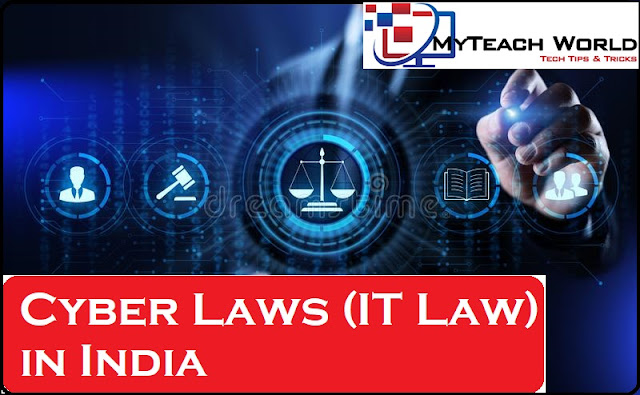In some cases, IT Rules 2000 issued separately by the IT Department of the Government of India apply. The law also provides for profiteering to keep innocent people safe from complaints. But computer and internet consumers should always be cautious that there is no unintentional violation of cybercrime or cyber law.
READ MORE:
- [Instagram Followers Trick] How to Get Free Real Instagram Followers in 2020
- [Instagram Hack] Creating instagram phising page And how to hack instagram account | New Method 2020
- [Whatsapp Crash 2020] How to Crash someone’s Whatsapp or Whatsapp Group | Hang anyone’s whatsapp
- [Facebook Trick] How to create [invisible] blank name id on facebook – 2020
- [3 Methods] How to find WiFi Password on Android without Root?
- How To Download FMWhatsApp APK (Official) Latest Version 8.26 (2020)
Cyber Laws (IT Law) in India | Everything about Indian Cyber Laws
Here, Complete information about Indian cyber law. read the post till last.
In today’s article, we will know what are the things that come in Cyber Law, what are the holders of Cybercrime and what is the punishment of Cybercrime?
H@CKING:
Hacking means unauthorized entry into any computer, device, informational system or network or stealing any DATA.
Hacking can be done through physical access, or it can be through remote access. It is not necessary that in the process of Hacking, Victim’s system must be damaged. Even if there is no damage to the Victim’s system, the intrusion is subject to cyberlaw for which there is a provision of punishment.
Law of Hacking and Punishment:
Hacking can be expedited under Section 43A, Section 66, Section 379 and Section 406 of the IT Amendment Act, 2008. If proven to be a crime of hacking, he may have to pay 3 years in jail or a fine of up to 5 lakh.
DATA BREACH:
Data Stolen is the theft of private or confidential data from someone else, any technical system of the organization.
If you have official access to any field, and if you are authorized to use it, but you use it without permission, then it will still come under Data Breach. Departments like a call center, back-office have also come up with such data stolen cases.
Law of Data Breach and Punishment:
Theft of data applies to Section 43B of IT Amendment Act, 2008, Section 66E, Section 77C & IPC 379,405,420 and Copyright ACT. Depending on the crime, you may have to pay 3 years in jail or a fine of up to 2 lakh.
SHARE VIRUS AND SPYWARE:
People do not pay attention to the cleanliness of viruses & Spyware on the computer. Through their computer, the virus reaches others. Hacking, Download Viruses are also spread through the company’s internal network, WiFi Connection and Unsecured Flash USB drive or CD.
There is a whole industry of criminals making the virus, and their action is also taken against them. By the way, common people can also come under the purview of the law, if due to their negligence, the dangerous virus can reach someone’s system, and do some great harm to them.
Law of Publish Virus and Punishment:
Sections 43C, 66, IPC 268 of the IT Amendment Act, 2008, on crimes committed to threaten the security of the country, also related to terrorism, Section 66F, which is a non-bail clause.
Virus and spyware spreads have different punishments, such as cyberwar or cyber terrorism-related offenses, with imprisonment for life, and in another case with 3 years of imprisonment or heavy fines.
IDENTITY THEFT:
Use of data related to another person’s identity, secret information,
etc. Any person’s credit, debit card number, password, Aadhaar card number, digital number, eCommerce password, such as online shopping by stealing personal identity, or withdrawing money from their bank is a cybercrime.
When you commit a crime while pretending to be someone else, they come under the purview of IDENTITY THEFT.
Law of Identity Theft and Punishment:
Section 43, Section 66C, IPS 419, etc. of the IT Amendment Act, 2008 is possible, and if a person commits this offense, he/she may have to pay 3 years in jail or a fine of up to 1 lakh.
EMAIL SPOOFING FRAUD:
Using another person’s email address, sending an email to another person for some wrong purpose is covered under Cyberlaw. Such frauds are done more to spread hacking, phishing, spam, viruses.
Their purpose is to cheat the email recipients and get their confidential information. Such information includes Bank Account Number, Credit card, Facebook, Gmail, eCommerce Website password, etc.
Law of Email Spoofing fraud and Punishment:
Under Section 66D, IPS 417, 419, 420, 465 of the IT Amendment Act, 2008, there is a 3-year jail or fine for E-mail Spoofing and Fraud.
PR@N*GRAFY:
The range of this category includes such material as photos, videos, text, audio, which is based on nudity! Prevention of PR@N*GRAFY is applicable when publishing such material in an electric manner, sending it to someone or publishing it through someone else.
Who makes other’s dirty videos or make MMS and feed it to others through the internet like Youtube, Facebook, Whatsapp Or if someone messes dirty without his will, then they also come under its purview.
Note: There are some exceptions like it is illegal to publish such videos or to poke others through the internet, but it is not illegal to see or hear. it is also illegal to watch child videos.
Law of PR@N*GRAFY and Punishment:
Section 66A of the IT Amendment Act, 2008, IPS 292,293,294,500,506 and 509 is applicable, for violation of which, in terms of the seriousness of the offense, a penalty of 5 years in jail or 10 lakh on the first mistake and jail term of 7 years on the second mistake. It might be possible.
Hack OF:
Torture also comes under cyber law. On social networking sites such as Facebook, Whatsapp, Instagram, cases of harassing children or women are most exposed.
Sending obscene or threatening messages or harassing anyone in any form with the help of digital technology. It comes under cyber law. Spreading rumors against someone or defaming his name is all under the hack of cybercrime.
Law of Hack of and Punishment:
Section 66A of the IT Amendment Act, 2009 is applicable, and if it is violated, the person may face up to 3 years in jail or a heavy fine.
Conclusion:
In today’s article, what is the punishment for violating the laws related to cyber law, cybersecurity, all the ACT related to Indian cyber laws and their laws and violating the law under those ACT? I have tried to share the complete information with you.
So, friends, this is the end of the article, If you liked this post, please do not forget to share it, without your support, I can not reach this knowledge even further, so help me by sharing my post so that I can bring you a tricks more than one To share the post, you can use the share buttons given below, and, If you face some problem in any steps please drop your email by going to contact us section of this site. thank you so much, stay tuned with this blog and blog’s admin Mr. Aditya Singh







